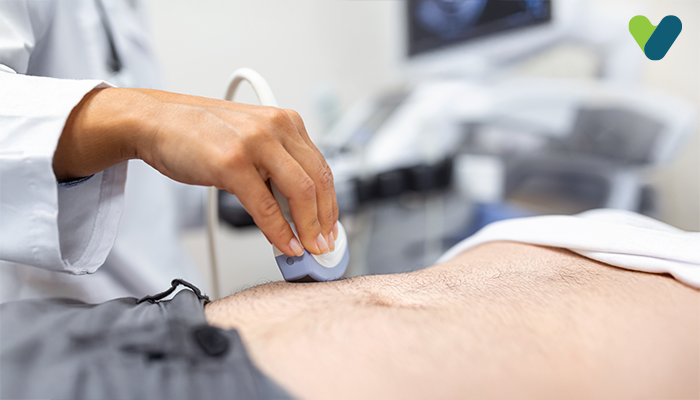KUB Ultrasound / KUB Sonography
KUB Ultrasound is a test of the Kidneys, Ureters, and Bladder. If you analyse a body diagram, you will find the kidneys on the backside of the abdomen. They are responsible for separating the waste from the blood and creating urine. The urine is then transported to the urinary bladder via the ureters. The urinary bladder collects urine through the ureters. These are thin tubes, and together these organs form the urinary tract.Disposing of waste from the body is an essential process. It removes all toxins that would otherwise keep building in the body, and trust us, no one wants that. However, this process is disrupted if any of the organs in the urinary tract isn’t functioning as it should.
The KUB ultrasound test is done to examine the urinary tract of the patient. It is a great tool to pinpoint the area of concern.
Like any other ultrasound, the KUB ultrasound test is safe and accurate. It is a painless and non-invasive procedure that uses high-frequency sound waves. Here, a hand-held device known as a transducer is used. It creates an image of the lower abdomen area based on echoes that are reflected. The graphs are obtained to aid the medical professionals in treating the patient correctly.
Also Read : Kidney Profile Or Kidney Function Test (KFT)
KUB Ultrasound Purpose
If you are experiencing renal or pelvic pain, your doctor is likely to assign you a KUB ultrasound.A KUB ultrasound test is needed in case of any trouble with the urinary tract. In females, it examines the kidneys, ureters, and bladder. Seminal vesicles and prostate glands are also included in a male’s examination.
It assesses any changes in the structure and size of the kidneys. The difference can be due to infections, whose cause is to be determined thereof. It also inspects any change in the size of the bladder wall.
Any obstruction in the urinary path is also analysed. This can be in the form of stones in the kidneys or the urinary tract. The KUB ultrasound test can also locate any cysts or tumors that may have developed.
Complications in the form of a Urinary Tract Infection (UTI) can be painful. These are also analysed using a KUB ultrasound test.
In case of an accident or otherwise, the lower abdomen area can be harmed. The ultrasound is done to analyse any injuries to the kidneys.
It has quite a lot of uses. In all, any issues that cause discomfort in the lower abdomen can be looked at. The scans provide a clear image of what may be bothering you.
KUB Ultrasound Procedure
Once you reach the radiology lab, all you have to do is lay down on your back. You will be asked to expose your lower abdomen area. The medical professional will then apply a gel on the area to be scanned. After this, a transducer is pressed over the area. It gives out high-frequency sound waves that are inaudible to the human ear. This helps in creating and recording echoes which are then projected as images. This is the end of the test. The professional shall wipe off the gel for you to get dressed.The results are usually available within 30 minutes. Post this, the doctor gets a better understanding of the problem. This helps in providing an apt solution so the patient can recover as soon as possible.
Also Read : Are You Worried About Your Creatinine Levels?
KUB Ultrasound Preparation
As such, you do not need to prepare much. A few basic things may be required depending on the situation and the area being tested. Your doctor may ask you to avoid eating food and fast for a few hours.Conversely, you may be required to drink plenty of water before the KUB ultrasound test. This is more likely as the urinary tract is analysed. During this period, you are advised not to empty your bladder at all. This helps in examining the capacity of the bladder. Later, a second ultrasound may be scheduled after emptying the bladder. This gives a before and after view for better understanding.
Overall, the KUB ultrasound test has no other requirements. It is a risk-free process. It does not expose the patient to any form of radiation. This quick procedure proves beneficial for getting a better view of things that may need urgent attention.
References:
- Diagnostic Accuracy of Ultrasound and Plain X-Ray KUB (Kidney, Ureter, Bladder) Compared to Non-Contrast CT (Computed Tomography) in Patients of Ureteric Calculi. Journal of Evidence-Based Medicine and Healthcare [Internet]. https://www.jebmh.com/articles/diagnostic-accuracy-of-ultrasound-and-plain-xray-kub-kidney-ureter-bladder-compared-to-noncontrast-ct-computed-tomograph.pdf.pdf. Accessed Nov 15, 2021.
- Renal and Bladder Ultrasound and KUB. UWMC Health Online [Internet]. https://healthonline.washington.edu/sites/default/files/record_pdfs/RenalAndBladderUltrasoundAndKUB9_99.pdf. Accessed Nov 18, 2021.
- Kidneys, Ureters, and Bladder (KUB) Imaging. Medscape [Internet]. https://emedicine.medscape.com/article/2165400-overview?form=fpf. Accessed Nov 22, 2021.
- Kidney, Ureter, and Bladder X-ray. John Hopkins Medicine[Internet]. https://www.hopkinsmedicine.org/health/treatment-tests-and-therapies/kidney-ureter-and-bladder-xray. Accessed Nov 24, 2021.


